Join us from 8:55 until 11:45 a.m. on Friday, October 23 for part one of this two-part program that examines a number of key real estate issues, recent caselaw updates and legislative changes that affect your client. Listen to experienced real estate attorneys as they discuss foreclosures, forbearances and real estate-related bankruptcy issues. Learn about condominium issues in the COVID (and post-COVID) pandemic. Understand reassessment of property valuations, as well as incentives given to developers for rebuilding. Engage with a panel of distinguished attorneys as they discuss the hot topics in real estate, including the impact of COVID-19 on the practice of law involving real estate.
ISBA members, sign up to receive The Bar News' biweekly e-newsletter by emailing emailpreferences@isba.org
-
October 12, 2020 | CLE

-
October 12, 2020 | Practice News
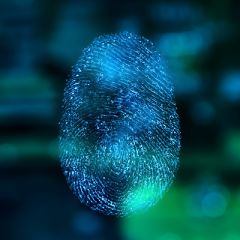 As with any new technology, the use of biometrics comes with complications. If it is suspected that the device has been used to commit a crime, law enforcement is authorized to apply for a warrant to search the device. If the device is protected by a biometric feature, the government will seek authorization to compel the owner to unlock the device. In his October Illinois Bar Journal article, “I Can’t Quite Put My Finger on It,” Thomas A. Drysdale asks whether a person can be compelled to provide a biometric feature to unlock a device and finds that, due to the constitutional protection against self-incrimination, courts have struggled to find an answer. Drysdale examines the constitutional implications of compelling biometric features, compares differing judicial opinions, and provides background information for the Illinois practitioner approaching the issue.
As with any new technology, the use of biometrics comes with complications. If it is suspected that the device has been used to commit a crime, law enforcement is authorized to apply for a warrant to search the device. If the device is protected by a biometric feature, the government will seek authorization to compel the owner to unlock the device. In his October Illinois Bar Journal article, “I Can’t Quite Put My Finger on It,” Thomas A. Drysdale asks whether a person can be compelled to provide a biometric feature to unlock a device and finds that, due to the constitutional protection against self-incrimination, courts have struggled to find an answer. Drysdale examines the constitutional implications of compelling biometric features, compares differing judicial opinions, and provides background information for the Illinois practitioner approaching the issue. -
October 9, 2020 | ISBA News
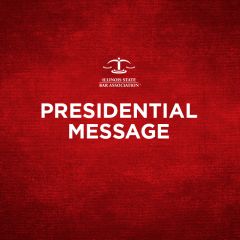 An independent judicial branch of government is foundational to our American democracy. While it means that our judges and courts should be free of influence from the other branches of government, it also means that the judiciary should be free of influence from private or special interests. The rule of law means nothing if judges are not able to impartially decide both public and private legal disputes with complete independence.1 comment (Most recent April 15, 2021)
An independent judicial branch of government is foundational to our American democracy. While it means that our judges and courts should be free of influence from the other branches of government, it also means that the judiciary should be free of influence from private or special interests. The rule of law means nothing if judges are not able to impartially decide both public and private legal disputes with complete independence.1 comment (Most recent April 15, 2021) -
October 8, 2020 |
ISBA News
The Illinois State Bar Association’s Board of Governors approved three new Professional Conduct Advisory Opinions on September 25 during its regularly scheduled Board meeting. The opinions address an attorney’s duty to disclose confidential information about a client’s fraud to third parties in an effort to prevent, lessen, or rectify the fraud; a lawyer’s responsibility to hold funds whose ownership is disputed until the dispute is resolved; and the ethical Rules that do not bind an attorney to continue proceeding with an appeal of a court’s decision appointing a guardian for a client who currently lacks mental capacity, in the manner discussed between the lawyer and the client previously, when the client had adequate mental capacity.
-
October 6, 2020 | CLE
 Join us from noon until 1 p.m. on Wednesday, October 21 for "Workers’ Compensation and COVID-19 Rebuttable Presumption." Come ready with questions as we have a lively discussion with a respondent’s and petitioner’s attorney about the new law providing a rebuttable presumption of compensability under the Illinois Workers’ Compensation Act for a COVID-19 diagnosis. The panel will debate the new law’s effectiveness and strategy for handling a COVID-19 claim. The panelists will also discuss the impact on non-COVID-19 cases and whether a different remedy exists outside of workers’ compensation.
Join us from noon until 1 p.m. on Wednesday, October 21 for "Workers’ Compensation and COVID-19 Rebuttable Presumption." Come ready with questions as we have a lively discussion with a respondent’s and petitioner’s attorney about the new law providing a rebuttable presumption of compensability under the Illinois Workers’ Compensation Act for a COVID-19 diagnosis. The panel will debate the new law’s effectiveness and strategy for handling a COVID-19 claim. The panelists will also discuss the impact on non-COVID-19 cases and whether a different remedy exists outside of workers’ compensation. -
October 6, 2020 |
Practice News
The Illinois State Bar Association is inviting members to submit articles for publication in the Illinois Bar Journal (IBJ), our award-winning monthly publication that is sent to 28,000 attorneys throughout the state. When you become an author for the IBJ, you not only establish yourself as an authoritative subject matter expert, but you can also claim CLE credit for your work.
-
October 5, 2020 | Practice News
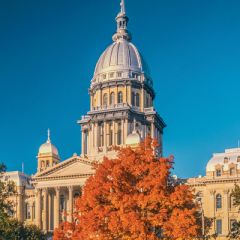 Child custody laws, driving with cannabis in one’s system, probating wills and estates—state laws addressing these and many other matters are often crafted with feedback from the ISBA, whose members have a seat at the legislative table because of their ISBA section involvement and the Association’s legislative affairs program. It is often said that the Association’s dozens of sections (and its special committees and task forces) represent its beating heart. Most of the ISBA’s networking, continuing legal education, and legislative involvement take place through these specialized groups. The October Illinois Bar Journal devotes its cover story to the tactics and strategies of the ISBA’s rigorous, hands-on legislative affairs program in which ISBA members are given an opportunity to shape the bills that often end up on the governor’s desk.
Child custody laws, driving with cannabis in one’s system, probating wills and estates—state laws addressing these and many other matters are often crafted with feedback from the ISBA, whose members have a seat at the legislative table because of their ISBA section involvement and the Association’s legislative affairs program. It is often said that the Association’s dozens of sections (and its special committees and task forces) represent its beating heart. Most of the ISBA’s networking, continuing legal education, and legislative involvement take place through these specialized groups. The October Illinois Bar Journal devotes its cover story to the tactics and strategies of the ISBA’s rigorous, hands-on legislative affairs program in which ISBA members are given an opportunity to shape the bills that often end up on the governor’s desk. -
October 2, 2020 | ISBA News
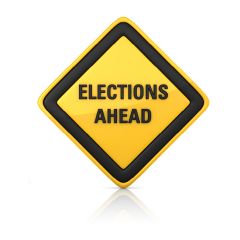 Campaign season for the 2021 Illinois State Bar Association election began October 1, for open leadership seats of third vice president (outside Cook County) and one seat each for the following Board of Governors seats: Area 1 (Circuit 18), Area 6 (Circuits 7, 8, and 9), and Area 8 (Circuits 3 and 20). There is also one Board of Governors seat in Cook County. There are 26 open seats for Cook County Assembly.
Campaign season for the 2021 Illinois State Bar Association election began October 1, for open leadership seats of third vice president (outside Cook County) and one seat each for the following Board of Governors seats: Area 1 (Circuit 18), Area 6 (Circuits 7, 8, and 9), and Area 8 (Circuits 3 and 20). There is also one Board of Governors seat in Cook County. There are 26 open seats for Cook County Assembly. -
October 1, 2020 |
Practice News
Self-represented litigants in the Illinois Appellate Court face many unique challenges without adequate resources to help them through the appeals process. A new pro bono opportunity, Illinois Free Legal Answers for Civil Appeals, is now providing them with more legal assistance. Illinois Free Legal Answers for Civil Appeals was developed in partnership with the Administrative Office of the Illinois Courts, Illinois Supreme Court Commission on Access to Justice, the American Bar Association and the Public Interest Law Initiative (PILI).
-
September 30, 2020 | Practice News
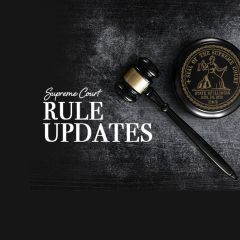 The Illinois Supreme Court today amended Rules 212, 306, 315, 316, 318, 341, 368, and 705. The changes go into effect October 1.
The Illinois Supreme Court today amended Rules 212, 306, 315, 316, 318, 341, 368, and 705. The changes go into effect October 1.

